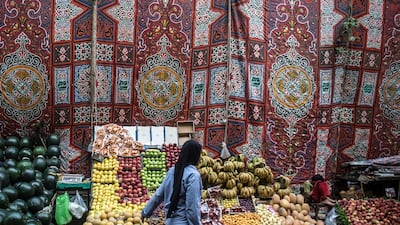TheMoody's Investors Service outlook for the Levant and North Africa is "broadly stable" for 2018, due to structural reforms, global economic growth and a simmering down of regional conflicts across the region. Morocco and Egypt are set to witness the region's highest economic growth this year.
"The improved global growth dynamics, ongoing structural reforms, and gradual re-opening of trade routes in former conflict areas, together with a planned reconstruction drive, will underpin GDP growth in 2018," said Elisa Parisi-Capone, a senior analyst at Moody's, in the agency's sovereigns outlook for the region, published on Tuesday.
“In addition, a tightening of global financing conditions poses fiscal risks for some countries, and elevated political risks will continue to drive event risk in the region.”
_______
Read More:
Moody's forecasts oil range of $40-$60 for 2018
Moody’s affirms A3 rating and stable outlook for Sharjah
_______
Moody's has assigned stable ratings to Egypt, Jordan, Lebanon and Iraq. Morocco, which recently liberalised its monetary policy, has a positive outlook, while Tunisia, which has been rocked by anti-austerity protests this month, has a negative outlook.
The rating agency expects economic growth in the next four years to be most pronounced in Egypt, which has been recovering over the past year from a period of chaos in the aftermath of a series of popular uprisings. The economy of the Arab world's most populous country is expected to increase from 4.2 per cent in 2017 to 5 per cent in 2019 and 5.5 per cent in 2021.
Morocco's economic growth is likely to ease slightly this year to 3.5 per cent from 3.9 per cent in 2017 due to lower contribution from agriculture, before recovering in 2019.
Tunisia’s economy is expected to grow 2.8 per cent in 2018 up from 2.3 per cent in 2017, in spite of recent unrest in the country over price increases. GDP in Iraq, meanwhile, is forecast to increase by 2.9 per cent in 2018, with Jordan and Lebanon due to witness growth of 2.5 per cent and 2.8 per cent, respectively.
Global economic growth will give a boost to regional exports and services, including tourism, remittances and investment flows in 2018, with a rebound in oil prices providing further support, Moody’s predicted.
However, the Levant and North Africa continue to suffer from structural weaknesses, especially in the form of inefficient labor markets and weak competitiveness, the agency said. And while political tensions in the region have quietened down, they will continue to be a source of investor anxiety.
“Elevated tensions between Saudi Arabia and Iran, lingering security risks from recent regional conflicts in Iraq and Syria, and recurring Israeli-Palestinian tensions will shape geopolitical risk in the Levant, whereas North Africa remains exposed to potential policy paralysis from popular opposition to fiscal reform,” Moody’s said.

